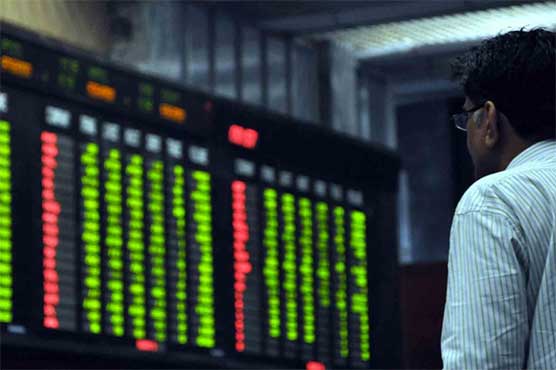PSX witnesses robust recovery: index edges up by 816.67 points

KSE-100 Index gained 816.67 points or 2.01 percent to close at 40,531.13 points.
KARACHI (Dunya News) – Pakistan Stock Exchange (PSX) on Wednesday witnessed robust recovery on the back of healthy buying.
KSE-100 Index gained 816.67 points or 2.01 percent to close at 40,531.13 points. Volumes stood at 126,563,500 million shares.
The market remained positive throughout the day as the media sources indicating that the government will get relaxation from IMF on revenue target ignited the index to a noteworthy recovery.
Of the 94 traded companies in the KSE100 Index 77 closed up 12 closed down, while 5 remained unchanged. Total volume traded for the index was 126.56 million shares.
Sectors propping up the index were Commercial Banks with 200 points, Oil & Gas Exploration Companies with 139 points, Cement with 94 points, Fertilizer with 91 points and Oil & Gas Marketing Companies with 61 points.
All Share Volume increased by 18.80 Million to 180.33 Million Shares. Market Cap increased by Rs.119.97 Billion.
Total companies traded were 362 compared to 342 from the previous session. Of the scrips traded 262 closed up, 79 closed down while 21 remained unchanged. Total trades increased by 9,506 to 72,911.
As confusion and uncertainty surrounds potential investors due to several persisting factors, the stock market in the previous week followed similar trend and lost massive 1,487 points or 3.6pc, representing the highest weekly decline in recent months during which the market regained much stability, and dropped to 40,143.63 at close on Friday.
A staggering sum of Rs276 billion was wiped off the market capitalisation at the Pakistan Stock Exchange (PSX) in five-day trading sessions of the last week. Foreign investors were net sellers in the equity market, offloading $4.1 million worth of shares.
Investors adopted extremely cautious behaviour after more headlines cover mounting deaths due to coronavirus taking full hold, a plunge in global crude oil prices, unchanged main policy rate by the State Bank of Pakistan at 13.25 percent for the next two months, uncertain FATF’s decision and political uncertainty in the country.
The SBP in the latest monetary policy statement kept the interest rate unaltered and pushed selling in the leveraged sectors such as cement and steel. Concerns over higher than expected reading of inflationary pressures and political uncertainty sparked by coalition partners of the government also kept investors away from the market.
Moreover, the outcome of Financial Action Task Force in the upcoming review remained unclear. Several reports claimed that the substantial progress was made to pull the country out of the grey list, but Minister for Economic Affairs Hammad Azhar noted it was premature to speculate on any outcome.
They were also spooked by uncertainty over the decision by the Financial Action Task Force (FATF) on Pakistan status to be decided later this month and the country’s ability to pull itself out of the grey list. Investors were also rattled over the inflation figures for January which came out at an alarming 12-year high of 14.6pc.
Importantly, the investors have also strongly noticed shortfall in revenue collection by about Rs350 billion as review talks with the International Monetary Fund (IMF) have begun for the release of its third tranche under the $6 billion facility.
On political front, unsettled political wrangling among the coalition partners of the government also hit confidence of the investors.
Every year the Chinese New Year celebrations bring supply chains to a halt as factories in China shut down and workers head home for the holidays. This year, however, the outbreak of the 2019 Novel Coronavirus during these holidays has disrupted movements, with the Chinese authorities extending the shutdown to Feb 12 in most provinces.
Some traders and businessmen in Pakistan said that loading of goods in China has come to a halt. Most industries that depend on raw materials imported from China usually build stocks to last them through the holiday closure, but in some cases at least those stocks are now running low and businesses are left wondering when normal imports might resume.

